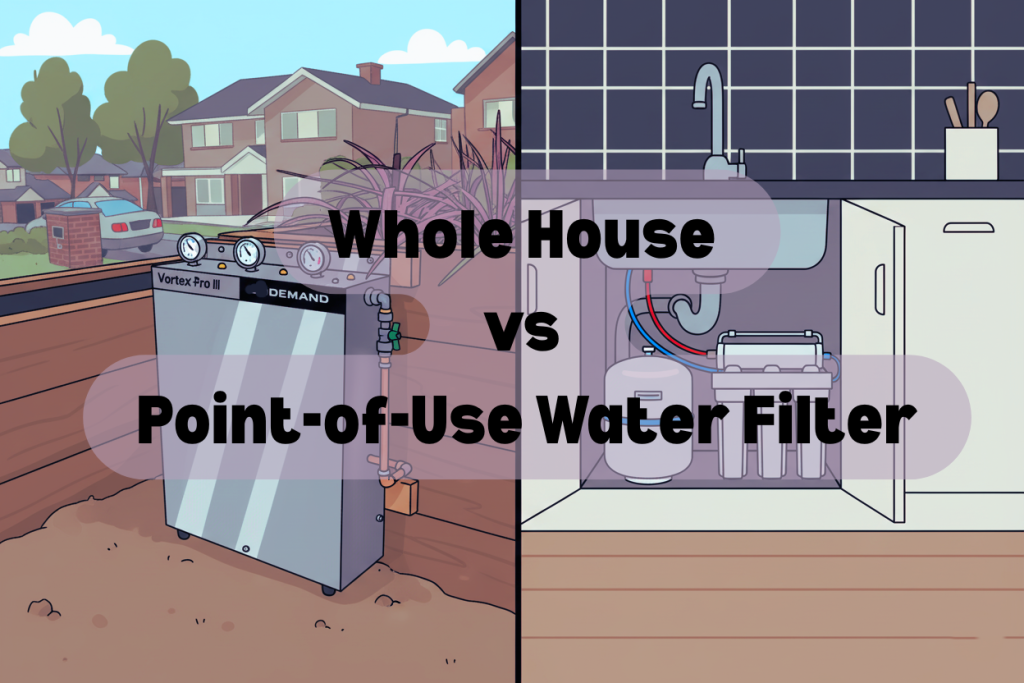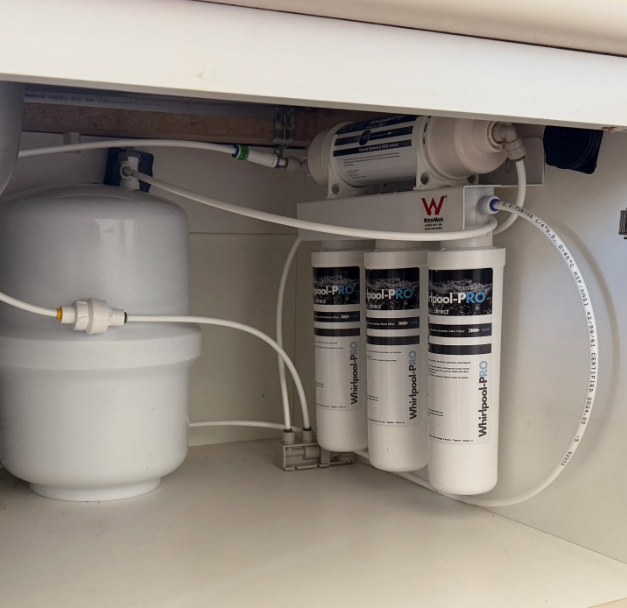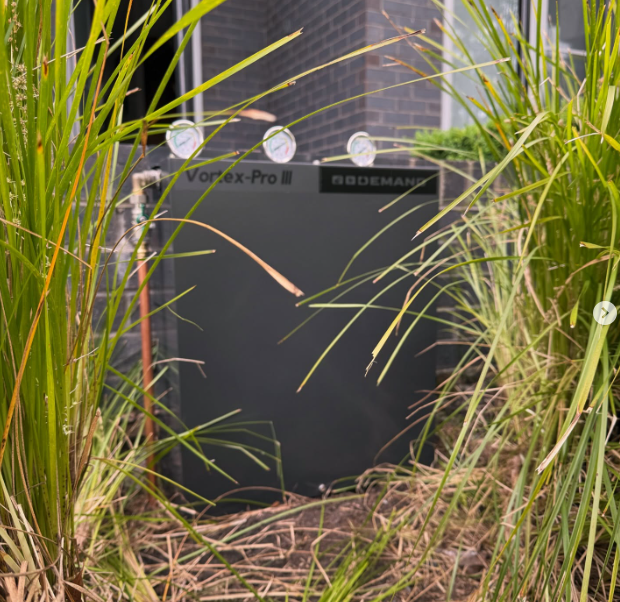Table of Contents

INTRODUCTION:
In this blog, we’re going to talk about the whole house vs point-of-use water filters debate in Australia and discuss which one is best for your home. Water is an essential element in our lives, and its purity is necessary for the health and well-being of our families. More and more Australian homes are installing water filtration systems every year. There are so many water filters available on the market that it can be difficult to decide on the right one for your home. Whole house and point-of-use water filters are both common choices, and each has advantages depending on your well water needs. Let’s look at each type and discover the appropriate filter option for your scenario.
What is a Whole House Water Filter?
A whole house water filter is a full-cleansing filter built to work on the principal water supply, treating all the water that enters your home from the point it connects to the main source. Consequently, every drop of water that comes from the taps, both in the kitchen, shower, or laundry, is properly cleansed. A whole-house water filter is usually installed at the point of entry, where the water gets straight to your house from the mains or well. It is a broad-based solution for those who need every source of water in the house to be treated.
Types of Whole House Water Filters
Whole house water filters come in several designs, and depending on whether you want to install one, several common designs have different capabilities to remove contaminants found in your water supply. Several options include:
Carbon Filters:
This is a very popular and pretty effective filter to use. The carbon filter will remove chlorine, volatile organic chemicals (VOC), and some heavy metals from your water. Carbon filters also provide an improved taste, will remove smells, and provide clean, fresh water.
Sediment Filters:
Sediment filters will remove larger particles like sand, dirt, silt, and rust. The sediment filters will protect your plumbing and water appliances from debris that can cause damage.
Reverse Osmosis (RO) Systems:
The RO system may be the most effective filter, and it is used to filter salts, heavy metals, chlorine, and fluoride. With the level of filtration, it may require more maintenance with this technology.
UV Filters:
The UV filter uses ultraviolet light to kill bacteria, viruses, and other microorganisms that may be lurking in your water, particularly ideal for those with untreated water or who use a well.
Pros of Whole House Water Filters
- Comprehensive Filtration: Whole house filter provides a stream of clean water throughout the home, putting purified water in the drinking, cooking, bathing, and laundry water.
- Convenience: Installing a whole house water filter adds the convenience of not having to fit appliance filters at the kitchen sink and water filter shower heads.
- Extended Appliance Lifespan: A whole-house water filter will prolong appliance life, such as kitchens, dishwashers, hot water heaters, and washing machines, by removing minerals, sediments, and chlorine.
- Improved Water Quality Throughout the Home: A whole house system guarantees that all taps, bathrooms, showers, hot water heaters, and laundry equipment are using filtered water. This would be beneficial for families with young children as well as those with sensitive skin.
- Increased Property Value: Homes with a whole house water system are often more valuable. The sale of the property is a whole house water purification upgrade from the normal non-purified water supply.
Cons of Whole House Water Filters
- Higher Initial Cost: The price tag attached to a whole filtration system can be quite steep. The filtration system itself is not inexpensive; it may also need to be installed professionally, so it can add to the initial purchase price.
- Complex Installation: Because a whole house filter typically involves plumbing, it is safe to say that most will require professional installation, especially larger homes with plumbing concerns, which will likely need your expertise.
- Ongoing Maintenance: These systems require more maintenance due to the large volume of water they filter. You’ll need to change the filters periodically, and depending on the system type, you may need professional maintenance or inspection.
- Not Ideal for Smaller Homes: If you live in a small apartment or household that uses minimal water, a whole house system may be overkill and unnecessary to fork out the expenses, as point-of-use filters may serve your needs.
What is a Point-of-Use Water Filter?

A point-of-use water filter is defined as any filtration system intended to treat water at places or points of use in the house, such as the kitchen sink, shower, or bathroom faucets. Point-of-use water filters are smaller and are generally located at the taps or appliances where the treatment is most needed. Various designs of point-of-use systems are available in the marketplace. These may include faucet-mounted units, under-sink systems, or countertop units, which can be installed at a point-of-use appliance, preferably providing a targeted water treatment system.
Types of Point-of-Use Water Filters
Under-sink filters:
To effectively remove contaminants like chlorine, lead, and heavy metals, an undersink filter, installed under your kitchen or bathroom sink, usually connected to the faucet you use to get drinking water, effectively purifies drinking and cooking water.
Faucet-mounted filters:
Faucet-mounted filters, typically more affordable than under-sink filters, attach to your faucet and allow you to filter as the water flows through.
Countertop filters:
Countertop filters, which filter water by connecting a hose from the filter to your faucet, sit on your countertop and can be convenient and useful if you only need filtered water occasionally for cooking and drinking.
Shower filters:
If you have sensitive skin or hair, shower filters can remove the chlorine and other impurities in your shower, so that fresh water enters your shower.
Pitcher filters:
Pitcher filters are an inexpensive and simple solution to make potable small amounts of water at a time, useful for drinking and cooking.
Pros of Point-of-Use Water Filters
- Cost-Effective: Point-of-use filters are typically significantly less expensive than whole-house systems and are a great fit for owners with limited budgets.
- Ease of Installation: Filters like a faucet-mounted filter or pitcher filter are simple to install, and some of them, like a faucet-mounted filter, can be visually installed in minutes or without hiring a professional.
- Customizable Filtration: With point-of-use filters, consumers can select the type of filter for their specific needs. Point-of-use filters can remove chlorine, heavy metals, and hard water minerals.
- Low Maintenance: Point-of-use systems require less maintenance than whole-house filters. Replaceable filter cartridges and the replacement of filters can usually be completed every 3-6 months, and overall, they are simple to install.
- Convenience: Point-of-use filters can be located where you need filtering. You can filter the water you drink in the kitchen or the shower in your bathroom to remove chlorine. This type of solution is moldable to your own individual household.
Cons of Point-of-Use Water Filters
- Limited Coverage: The main downside of point-of-use filters is that they only treat water at the point of installation. This means you would need multiple filters for different taps and appliances, increasing the overall cost.
- Inconvenience: Unlike whole house filters, which provide purified water to every tap, point-of-use filters only purify water where they are installed, which can be inconvenient for families or larger households.
- Not Ideal for Larger Households: For larger families, point-of-use filters may not be enough to meet water filtration needs at every faucet and shower, requiring the installation of multiple filters across the home.
Key Differences Between Whole House and Point-of-Use Water Filters
| Feature | Whole House Water Filter | Point-of-Use Water Filter |
| Coverage | Filters all water entering the home | Filters water at specific taps only |
| Installation | Complex, professional installation | Simple, DIY installation |
| Maintenance | More maintenance required | Low maintenance, easy filter change |
| Cost | Higher upfront cost, expensive | Affordable, lower initial cost |
| Water Filtration Capacity | Large capacity for the entire house | Limited to specific areas/taps |
| Suitability | Ideal for large families or homes | Best for small households or specific needs |
| Impact on Appliances | Protects appliances from sediment and scale | Limited effect on appliances |
Whole House vs Point-of-Use Water Filters: Which One is Best for Your Home?

When it comes to choosing a whole-house versus a point-of-use water filter, there are a few key indicators that may sway your decision. These two options are strong in their own way, depending on your water usage, home size, and the contaminants in your water.
1. Quality of Water in Your Area.
In Australia, water quality can be quite variable depending on location. Many major cities (e.g., Sydney, Melbourne, Brisbane) typically receive treated municipal water supplies but may still provide water with chlorine, residues, and traceable chemicals. If you merely want to remove these contaminants, a point-of-use filter may suit your needs. If you live in more rural areas of Australia or run a well, a whole house system is likely a better option to ensure the removal of all contaminants.
2. Size of Your Household.
If you have a large home (meaning multiple bathrooms) or a larger family, a whole house filter will probably be the most feasible option. It will help to ensure better access to clean, filtered water from every facet and appliance in your home. In smaller homes, a point-of-use may work with filtered water for drinking or cooking.
3. Budget Reflects Value
Whole house systems can have a high price tag up front, especially due to the greater size and complexity, and installation requirements. Point-of-use filters are cheaper and simpler to install and often are good for use on a budget; however, if there are several point-of-use filters to install, the budget may be challenged.
4. Maintenance and Longevity
If you don’t mind changing filters frequently and prefer the system to have low maintenance, a point-of-use system is more tailored. Whereas if you are searching for a complete service for the entire home, a whole house solution will be more effective but requires ongoing maintenance, including some visit-level service.
5. Environmental Effects
Whole house systems will generally use more water and energy when compared to point-of-use systems. So, if environmental footprint is critical, point-of-use systems will have a much lighter footprint.
Conclusion
Ultimately, the choice between a whole-house and point-of-use water filter will depend on your family size, water quality issues you’re concerned about, your budget, and maintenance preferences. If you have a larger family or you’re living in a rural area of the world that has water quality concerns, deciding upon a whole house water filter is an excellent choice for providing clean water throughout your entire house. Whereas, if you have no family or are looking for a budget-friendly filtering solution or would like to focus on specific point-of-use filtration, this option is a lovely solution as well.
Both of them will have tons of advantages, and in looking into your personal needs and preferences, you can choose the best water filtration option for you, ultimately, whether you are a fully inclusive whole house water solution or a specific point-of-use filter. You will know the water you are consuming is clean, safe, and pure.
_edited_9.png)